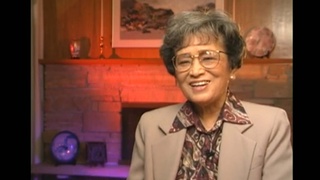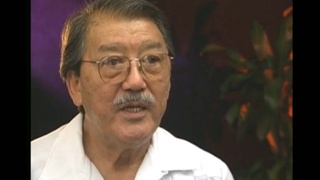Interviews
Appointing John Tateishi as National JACL Redress Chair
At the convention, when I became a national president, it was up for me to appoint a new national redress chair. I thought that I would be diplomatic. I asked some of the old timers to give me some of their advice on their thinking. I was given a very strong message by the old timers. They wanted [that] the new national redress chair should be: one, a Nisei(second-generation Japanese Americans); two, someone who was in camp; three, someone who was a 442nd veteran because the leadership felt that they would command more respect than the others.
When I chose John Tateishi1, some were very unhappy because John is a Sansei (third generation Japanese Americans). He was only six years old when he was in camp; he is not a 442nd veteran, obviously. But he was in camp, although he was a child. But one thing about John, I felt, was that he had the commitment to redress, which is very strong. Also, he knew how to communicate; he could talk to people.
1. John Tateishi (b. 1939) was appointed chair of the JACL National Redress Committee in 1978. It was during his chairmanship that the idea of forming a study commission to investigate the wartime removal and incarceration of Japanese Americans was first conceived. Tateishi was instrumental in urging the JACL to draft guidelines that outlined the organization's position on redress at the 1987 Salt Lake City convention. In 1987, amid increasing opposition within the JACL over operational differences, Tateishi left his staff position and the organization."
Date: July 1-2, 1998
Location: California, US
Interviewer: Mitchell Maki, Darcie Iki
Contributed by: Watase Media Arts Center, Japanese American National Museum
Explore More Videos

Finding supporters for the bill
(b. 1931) U.S. Former Secretary of Transportation

Thoughts on redress
(b. 1923) Nisei from Washington. Resisted draft during WWII.

Getting Jim Wright to sponsor the bill
(b. 1931) U.S. Former Secretary of Transportation

Positive experiences with Asian Americans for Action
(1924-2018) Researcher, Activist

Redress payments to Issei who did not enter camps
(1924-2018) Researcher, Activist

Waiting for the right time to start Redress Movement
(1924-2018) Researcher, Activist



Need for Monetary Compensation
(1923–2008) One of the leaders behind the redress movement.

Erasing the Bitterness
(1923–2008) One of the leaders behind the redress movement.



Why I joined the Japanese American Citizens League
Judge, only Japanese American to serve on CWRIC.

Figuring out a dollar amount for redress
Judge, only Japanese American to serve on CWRIC.

On hearing of CWRIC selection from Senator Inouye
Judge, only Japanese American to serve on CWRIC.
